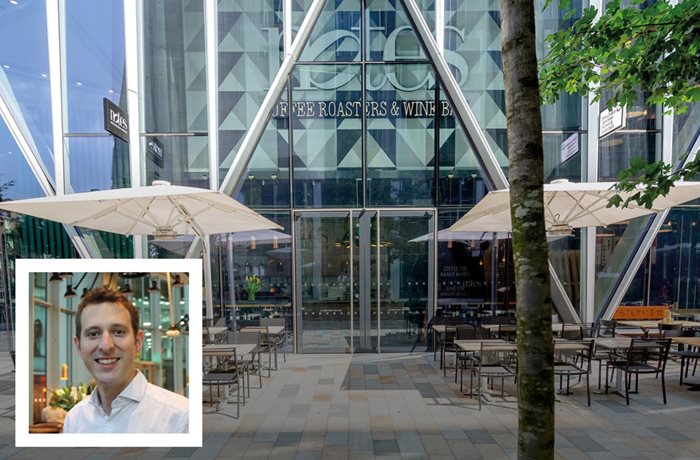Robert Robinson began his coffee career in 2007, opening a coffee kiosk in London after finishing university. In 2008, Robinson co-founded
Notes Coffee Roasters with business partner Fabio Ferreira. Today, Notes continues to blur the boundaries between boutique café, wine bar and bistro across its 11 London locations

Main image: Notes Victoria, London | Inset: Robert Robinson, Co-Founder, Notes Coffee Roasters | Photo credits: All photos courtesy of Notes Coffee Roasters
Serving early morning coffee and breakfast followed by lunch and an evening service is a tough gig, what made you take on this huge task?
Like any of the best ideas in hospitality and retail it was led by customer demand. When we first opened in the West End just off Trafalgar Square, we had people coming in at around 5-6pm before they went to the theatre. We were ready with our syphons and V60s, but what most of them really wanted was a glass of wine.
That’s when we applied for an alcohol licence and began our journey serving coffee and brunch during the day, moving to wine, beer, cocktails and small plates during the evening. We were nervous when we branched out from Theatre Land, but the alcohol side of the business really thrived in locations such as Canary Wharf and the City, where people still wanted somewhere relaxed, but more sophisticated than the pub, without going for a full restaurant meal.
“We didn’t want our evening customers to feel like they were having a glass of wine in a coffee shop”
What are some of the key lessons you’ve learned when translating your offer throughout the day?
The lighting, music, and all the elements that make the atmosphere are crucial. As we built and designed more venues, we learned to work with our interior designer to build our morning-to-evening concept into the DNA of each space. This was essential to make sure customers felt comfortable during the day and didn’t feel like they were having a coffee in a pub or bar. Likewise, we didn’t want our evening customers to feel like they were having a glass of wine in a coffee shop. That’s a difficult balance to get right, but lighting, music and candles can go a long way.
Adjusting from daytime bar service to evening table service is another important signifier and makes a big difference. Fridges, for example, are very much a grab-and-go daytime spot, but you don’t want them staring at you when you’re selecting a lovely bottle of red wine. The team, the atmosphere they create, and the welcome they give our guests is also crucial at every stage of the day. You don’t want someone who’s really passionate about wine being forced to get up at the crack of dawn and serve coffee if that’s not what they love doing.
While we do find there is some staff overlap in our venues, we mostly use different teams for the morning and the evening shifts. Evening team members still need to know how to make great coffee, but they’ll often have a different approach and perhaps a different career history. Wine and table service etiquette is slightly different to coffee bar etiquette, but there are loads of great people at Notes who can do both. It’s really satisfying when people return in the evenings and say it feels like completely different space.
.jpg.aspx?lang=en-GB&width=700&height=466)
Coffee by day, wine by night at Notes
How do you attain the same level of artisan craftsmanship you’ve achieved in coffee with wine?
We realised that we needed to get expertise early on. One of our first really significant additions to the team was a master of wine who advised us as a consultant on that side of the business. When we opened into the evenings at our second site, we recruited someone who had a background in wine, although as an Australian he was also interested in coffee.
Later we invested in a role whose responsibility is to solely look after the evening service, source great wines and make sure the customer experience is top notch and matches the standards we set earlier in the day.
From a business point of view, which is more profitable – coffee or wine?
Coffee is a higher margin, but wine is a higher average spend, so it balances out in that respect. You’ve got to sell a lot of coffee to pay the rent and the team, whereas once you’ve sold a few bottles of champagne you’re sorted for the night. Both are important to us.
Food has also become very important for us as we’ve expanded our brunch menu. In the early days, serving a really good cup of coffee during the day was enough, but customer expectations have rightly grown – people want to be able to have a top quality meal in a coffee shop.
It also depends on the location. In the City, people are less interested in food and are happy to have a few drinks and nibbles. At our West End locations there are more theatre goers and tourists who are more interested in eating during the day and the evening, so we sell more food there. Whichever Notes they visit, all our lovely regulars are united by a love of great coffee, delicious food and wine – and the warm welcome they get every time they walk through the door.
For more from Robert Robinson and blurring the boundaries between café and wine bar, tune into our podcst episode: Industry parallels – coffee vs. wine
This article was first published in Issue 8 of 5THWAVE magazine.
Subscribe to 5THWAVE to receive each edition in print and digitally or sign up to our newsletter and be the first to read the latest articles and updates on World Coffee Portal research
